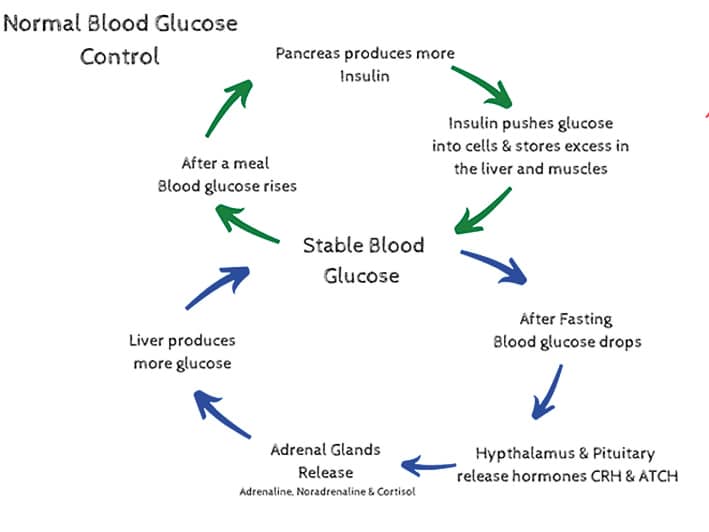In part one of a three-part series, Eoin Roe looks at blood sugar control, what can go wrong with this and what can be done to help correct it.
Normal Blood Glucose control
The normal glucose levels in blood are controlled by interactions between hormones and various organs in the body.
When we eat a meal, a snack, a drink, or anything other than water, our blood glucose levels rise. The immediate response in the body is for the pancreas to release insulin into the blood. Insulin’s job is to take any excess glucose that is not being used by the body and store it in the liver and skeletal muscles in a form of glucose called glycogen and your blood glucose will return to a normal level.
When we fast for a while, namely the gap in between meals or when we sleep, blood glucose levels drop. This is monitored by part of the brain called the hypothalamus, which starts a cascade of hormones that restabilising your blood sugar.
The hypothalamus releases a hormone called CRH, which in turn stimulates the pituitary gland to release ATCH, which stimulates the adrenal glands to release three hormones adrenaline, noradrenaline and cortisol. These all have an action on the liver to release the stored glycogen and convert it back to glucose therefore rising your blood glucose back to a normal level.
The above is a very basic overview of the process of blood glucose stability. There are some other interesting factors that will also impact on your body’s ability to handle glucose well. In the diagram attached to this article it seems that there is a linear progression from one process to the next; but it is more complex than that, with multiple communications between different organs in the body.

For example when you think about eating something sweet your brain will stimulate the pancreas to release insulin in preparation for having that food.
There are other pathways that involve the relationship between the brain and the pancreas. Circadian rhythms respond to light and dark, sleep and wake cycles, and have an effect on how much energy your body needs, these all feed back into the brain through a region called the hypothalamus and help to control blood glucose levels.
You will hear many people supporting the idea of gut health and the microbiome; one of the most important reasons for this, is that it has a role to play in the correct management blood sugar though a hormone called incretin. Incretin stimulates endocrine glands to release insulin, glucagon and somatostatin. Healthy incretin levels are related to having a healthy microbiome and this is related to your diet specifically how much fibre is in your diet?
As you can see the control of blood sugar levels is of vital importance but requires complex interactions between many of your bodies organs. With so much happening it is easy to understand how this system can go wrong.
In the next part of this series, I will go over Insulin resistance and metabolic syndrome, which are stages on the path to Type 2 Diabetes.
Eoin is a Chiropractor and Functional Medicine specialist working in Skibbereen. If you would like help to manage your blood sugar or any health problems please contact me on 087 9582362.


